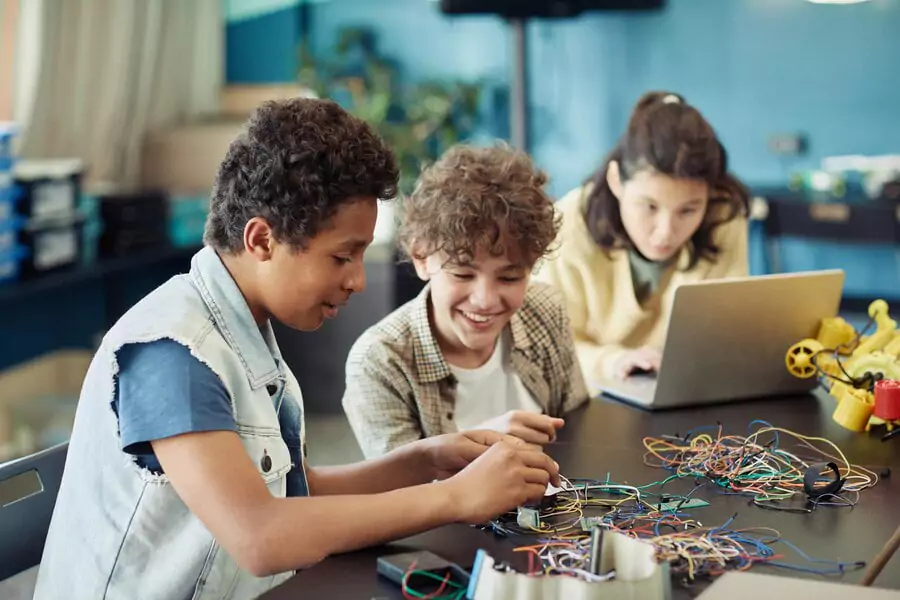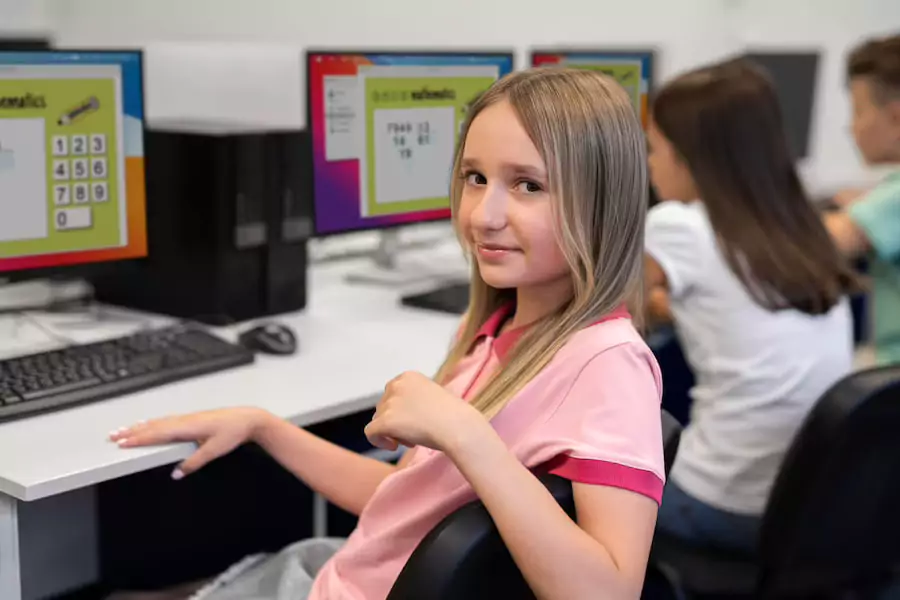In the ever-evolving educational landscape, EdTech has been experimenting with gamification for over a decade, seeking effective ways to enhance student motivation. Pioneering this transformation are Manuj Dhariwal and Shruti Dhariwal, two insightful Ph.D. candidates from MIT’s Lifelong Kindergarten research group. They believe that a radical new approach could revolutionize the way digital education is perceived and delivered.

✅ AI Essay Writer ✅ AI Detector ✅ Plagchecker ✅ Paraphraser
✅ Summarizer ✅ Citation Generator

Key Takeaways:
- EdTech is changing the way it uses games in learning, with new ideas from MIT researchers, the Dhariwals.
- The Dhariwals created CoCo Learn, a platform where young learners can work together in real-time to create games, art, music, or stories.
- Companies like Boddle and Quizizz are shifting focus from individual competition to teamwork, effort, and rewards not just based on academic success.
- The big challenge for EdTech is to make sure these new ways of teaching really help students learn, not just keep them entertained.
The Genesis of the Idea
The seed of innovation was planted in the most unexpected of places. The Dhariwals were attending a mindfulness retreat near MIT when they encountered a group of 12-year-olds deeply engrossed in discussions about online shooting-based video games. It was an “aha” moment. As Manuj Dhariwal recalls, “They made us realize that digital interactions for young learners needed to be as dynamic and engaging as their favorite video games.” This conversation underscored the need for a digital experience for kids that is captivating, yet not solely focused on competition or social media-style interaction.
The Creation of CoCo Learn
With this newfound perspective, the Dhariwals dedicated themselves to a project which would later become CoCo Learn. Launched in 2019, CoCo is a real-time, co-creative platform that fosters a collaborative learning environment. It allows young users to share or swap code, thereby creating online games, artwork, music, or even stories together. Standing distinct from Scratch, another MIT Media Lab product, CoCo prioritizes community over competition. As Shruti Dhariwal puts it, “CoCo is about collective creation and learning, not about likes or followers.”
The Global Impact of CoCo Learn
The timing of CoCo’s introduction was serendipitous. With the sudden onset of the global pandemic in 2020, digital learning took center stage. This rapid shift towards rethinking education into an online form has compelled the creators to add video and chat features to CoCo, making it a comprehensive learning tool. As of now, CoCo is in its beta phase, gathering invaluable feedback from educators across 65 different countries.
The Evolving Strategies in EdTech
EdTech companies, gleaning insights from their decade-long journey with gamification, are now revising their strategies. Learning from innovative platforms like Quizizz and Boddle, they are exploring nuanced methods of incorporating game-based elements into their educational offerings. The focus is gradually shifting from individual competition to group competitions, persistence, and rewards not solely tied to academic proficiency. These incentives might even include personalized items like Custom Canvas Prints.
The Influence of Quizizz and Boddle
For instance, Boddle, a multiplayer math learning game, has chosen to celebrate attempts over correct answers. “We want to motivate students by acknowledging their efforts, not just their successes,” says the CEO of Boddle. Similarly, Quizizz has introduced a “mastery” mode, creating competition tiers based on students’ proficiency levels. This approach seems to be yielding positive results. As per Quizizz’s internal data, “Now 100% of students re-attempt questions they initially got wrong, up from a third previously.”
The Future of CoCo Learn and its Counterparts
CoCo, initially a niche platform, is gradually integrating mainstream curriculum elements.

Students are using it to grasp complex geometric concepts and even prepare presentations for English or social science classes. However, CoCo, along with its venture-backed counterparts, still face the challenge of perfecting the delicate balance between engagement, competition, and learning outcomes.
Here, you can find a detailed comparison of three educational technology platforms: CoCo Learn, Quizizz, and Boddle. It compares these platforms based on their creators, a detailed description of their functionality, their primary focus areas, and their unique features.
| Platform | Creators | Detailed Description | Primary Focus | Unique Features |
| CoCo Learn | Manuj Dhariwal and Shruti Dhariwal (MIT) | CoCo Learn is a real-time, co-creative platform that was launched in late 2019. It allows young users to share or swap code, facilitating the co-creation of online games, artwork, music, or stories. The platform’s design encourages collaboration and creative learning instead of competition. | Collaboration and creation | Unlike many other platforms, CoCo Learn does not feature individual user profiles, likes, or followers. The platform added video and chat features during the COVID-19 pandemic, responding to increased remote learning needs. |
| Quizizz | Ankit Gupta and Deepak Joy Cheenath | Quizizz is a learning platform where users can create and play quizzes. It encourages students to learn at their own pace while fostering a competitive environment. | Individual and group competition | Quizizz features a “mastery” mode, which creates competition tiers based on students’ proficiency levels. The platform’s data suggests that this feature has significantly increased student engagement and re-attempt rates. |
| Boddle | Clarence Tan and Edna Martinson | Boddle is a multiplayer math learning game. It differentiates itself by focusing on rewarding persistence and effort rather than correctness, encouraging a growth mindset in learners. | Persistence | Boddle innovatively rewards students for their attempts rather than just for correct answers, thus promoting an approach of learning through trial and error. |
The Future of EdTech Gamification
EdTech is undergoing a significant shift, reevaluating its decade-long commitment to gamification to motivate learners more effectively. Leading this transformation are the Dhariwals from MIT, with their co-creative platform, CoCo Learn. Alongside platforms like Quizizz and Boddle, they are pioneering a more nuanced approach to game-based learning that prioritizes collaboration and persistence over competition. As EdTech continues to evolve, the industry’s primary challenge will be to ensure these new methods promote real, meaningful learning, not just superficial engagement.
Gamification, EdTech Innovations, and Staying Informed
Gamification in education, a concept involving the use of game-based elements in learning, is proving transformative. This approach, featuring point systems, leaderboards, badges, and progress bars, aims to increase student motivation and engagement. Examples of gamified learning can be seen in platforms like Quizizz, Boddle, and the educational applications of Roblox and Minecraft.
Notably, EdTech companies are reimagining ways to inspire learners, moving beyond mere competition and leaderboards. For instance, the MIT Lifelong Kindergarten research group’s project, CoCo Learn, prioritizes real-time collaboration and creation. This innovative approach enables students to share or swap coding, create artwork, music, or collectively write stories, creating a dynamic, social media-like environment. On the other hand, platforms like Quizizz and Boddle are focusing on rewards and persistence, cultivating learning outcomes through game-based learning and mastery modes.
To keep abreast of the latest developments and research in education, one can tap into a plethora of resources. Regularly following leading EdTech companies, subscribing to academic journals, and participating in webinars or conferences can be invaluable. Platforms like Scratch or Google Docs and participation in digital experiences, such as mindfulness retreats or online shooting-based video games, can offer unique insights. Specific areas, like reading comprehension or geometry, offer interactive art projects or variables-based applications to keep educators updated with the latest pedagogical techniques. Additionally, tracking the work of research groups like the MIT Lifelong Kindergarten can provide a deep dive into new educational strategies and innovations.
Read more:
Internet of Things Security Challenges and Impact on Critical Infrastructure
NYC Schools Face ‘Quiet Problem’: A Striking Lack of Librarians
Effects of Race on Housing Inequality in New York city
Follow us on Reddit for more insights and updates.





Comments (0)
Welcome to A*Help comments!
We’re all about debate and discussion at A*Help.
We value the diverse opinions of users, so you may find points of view that you don’t agree with. And that’s cool. However, there are certain things we’re not OK with: attempts to manipulate our data in any way, for example, or the posting of discriminative, offensive, hateful, or disparaging material.